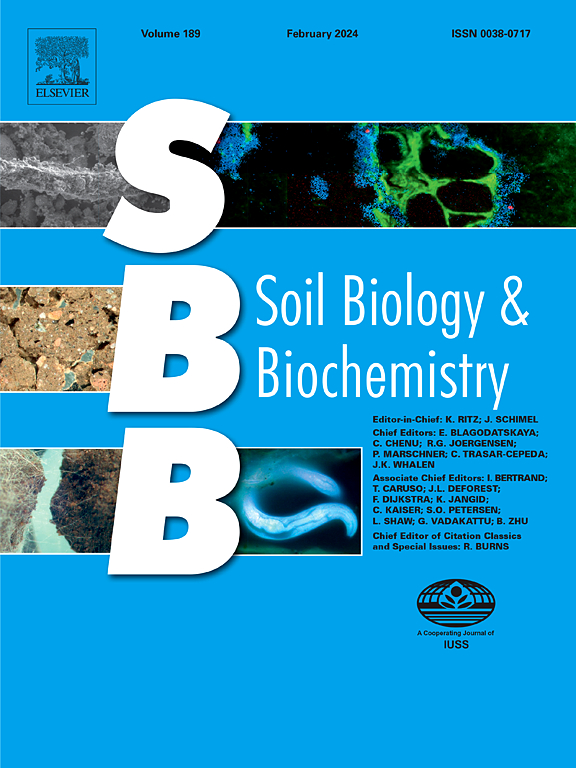微生物对土壤pH值的调节:以芽孢杆菌为例的自利机制
IF 10.3
1区 农林科学
Q1 SOIL SCIENCE
引用次数: 0
摘要
大多数研究集中在微生物如何应对环境变化,但对微生物如何改变其周围环境知之甚少。在这项研究中,我们采用芽孢杆菌,一个以其弹性和广泛应用而闻名的模式属,来研究微生物可以改变环境条件以更好地适应其需求的假设。利用全球土壤数据集分析和对照实验室实验相结合,我们探索了微生物对不同土壤pH条件的适应策略和机制。全球土壤数据分析结果显示,土壤pH值显著影响芽孢杆菌的丰度、多样性和功能能力,pH值在6.5左右时丰度最高。在酸性或碱性土壤中接种35 d后,芽孢杆菌的pH值向中性偏移。与对照(CK)相比,接种芽孢杆菌能显著降低碱性土壤pH,使pH从8.13降低到7.36,使酸性土壤pH升高5.86 ~ 5.91。代谢谱显示了pH依赖性调节:碱性代谢物(如十二胺)在pH为5的酸性培养基中富集(1529倍),而酸性代谢物(如有机酸)在pH为8的碱性培养基中增加(1.5倍),反映了适应性pH胁迫反应。微生物群落分析表明,接种芽孢杆菌不仅改变了原生微生物组成,而且与特定的微生物类群密切相关,推测这些类群在调节土壤ph中具有潜在的合作作用。我们的研究结果强调了微生物可以以可预测的方式改变其环境,为微生物-环境相互作用提供了有价值的见解。本文章由计算机程序翻译,如有差异,请以英文原文为准。
Microbial modulation of soil pH: A self-benefiting mechanism exemplified by Bacillus
Most studies focus on how microorganisms respond to environmental changes, yet much less is known about how microorganisms alter their surroundings. In this study, we employed Bacillus, a model genus known for their resilience and broad application, to investigate the hypothesis that microorganisms can alter environmental conditions to better suit their needs. Using a combination of global soil dataset analysis and controlled laboratory experiments, we explored the adaptive strategies and mechanisms by which microorganisms respond to varying soil pH conditions. Our results from global soil dataset analysis revealed that soil pH significantly influenced the abundance, diversity, and functional capacity of Bacillus, with the highest abundance observed at around pH 6.5. When inoculated in acidic or alkaline soil for 35 days, Bacillus shifted the pH towards neutrality. Compared with control (CK), only Bacillus inoculation significantly decreased alkaline soil pH from 8.13 to 7.36, and raised acidic soil pH by 5.86–5.91. Metabolic profiling indicated pH-dependent modulation: alkaline metabolites (e.g., laurylamine) were enriched in acidic medium of pH 5 (1529-fold), while acidic metabolites (e.g., organic acids) increased in alkaline medium of pH 8 (1.5-fold), reflecting an adaptive pH stress response. Microbial community analysis revealed that the inoculation of Bacillus not only altered the native microbial compositions but also showed close associations with specific microbial taxa, which were speculated to have a potential cooperative role in regulating soil pH. Our findings highlight that microorganisms can modify their environment in predictable ways, offering valuable insights into microbe-environment interactions.
求助全文
通过发布文献求助,成功后即可免费获取论文全文。
去求助
来源期刊

Soil Biology & Biochemistry
农林科学-土壤科学
CiteScore
16.90
自引率
9.30%
发文量
312
审稿时长
49 days
期刊介绍:
Soil Biology & Biochemistry publishes original research articles of international significance focusing on biological processes in soil and their applications to soil and environmental quality. Major topics include the ecology and biochemical processes of soil organisms, their effects on the environment, and interactions with plants. The journal also welcomes state-of-the-art reviews and discussions on contemporary research in soil biology and biochemistry.
 求助内容:
求助内容: 应助结果提醒方式:
应助结果提醒方式:


